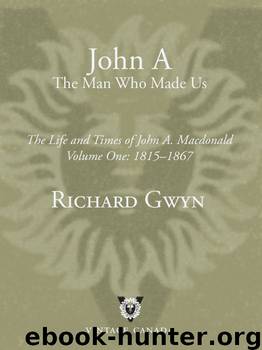John A by Richard J. Gwyn

Author:Richard J. Gwyn
Language: eng
Format: epub
ISBN: 9780307371355
Publisher: Random House of Canada
Published: 2008-08-23T16:00:00+00:00
That Britain might, if not actually abandon Canada, then gently but firmly pull itself back from a close embrace in order to position itself nearer to the United States, challenges the generally presented view of Canada as the nineteenth-century linchpin of the British Empire. After all, without Canada, the Empire would no longer stretch around the world in an unbroken chain on which the sun never set. At the time, though, such a gap would not have mattered that much—simply because the Empire did not matter that much to the British themselves.
The British Empire of the mid-1860s was not at all the Empire of bugles and banners and thin red lines that has been handed down in the history books. These flummeries existed then, but the Empire itself did not really exist. It did physically, of course. Britain was the global hegemon: it accounted for one-third of the world’s industrial output; its Royal Navy policed the seas; and London was easily the world’s largest and richest city. Moreover, the British Empire possessed the aura of having defeated Napoleon (a glory now fading fast) and the moral aura of having deployed the Royal Navy to sweep slavery from the high seas.*99
But it didn’t exist psychically. Rather than an empire, what Britain owned then was an agglomeration of territories acquired or conquered or bought or swapped or stolen “in a fit of absence of mind,” to use the famous phrase.*100 The British Empire, in the term’s ordinary meaning—the one it took Canada until the Statute of Westminster of 1931 to gain full independence from—didn’t come into being until the 1870s. Its birth is commonly dated to Disraeli’s purchase of the Suez Canal shares in 1875, although a better date might be 1872, when Disraeli turned imperialism into Britain’s political litmus test—and not coincidentally won power for himself—by attacking the Liberals, and his arch-rival Gladstone, for seeking “the disintegration of the Empire of England.”†101
Before this time, the British were quite uncertain whether they wanted to have an empire. The country was divided between “Big Englanders” like Disraeli and “Little Englanders,” who reckoned that any empire imposed far greater costs on Britain than benefits. Intellectually, the Little Englanders made all the running; they won a key argument over free trade in the 1840s, after which Britain’s trade no longer followed the flag but chased after profits anywhere. Disraeli himself spoke at times in the tones of a Little Englander; in 1852 he described the colonies as “a millstone around our necks.” As late as 1866 he reasoned from the emergence of a united Germany and a rising Russia that “power and influence we should exercise in Asia, consequently in Eastern Europe, consequently in Western Europe; but what is the use of these colonial deadweights which we do not govern?”(The peak of the Little Englanders came in 1868–72, when such views were held not just by Gladstone, then the prime minister, but also by his chancellor of the Exchequer, the foreign secretary and the colonial secretary.
Download
This site does not store any files on its server. We only index and link to content provided by other sites. Please contact the content providers to delete copyright contents if any and email us, we'll remove relevant links or contents immediately.
| Canada | Caribbean & West Indies |
| Central America | Greenland |
| Mexico | Native American |
| South America | United States |
Cat's cradle by Kurt Vonnegut(13868)
Pimp by Iceberg Slim(12931)
Underground: A Human History of the Worlds Beneath Our Feet by Will Hunt(11257)
4 3 2 1: A Novel by Paul Auster(11049)
The Radium Girls by Kate Moore(10907)
American History Stories, Volume III (Yesterday's Classics) by Pratt Mara L(4825)
Perfect Rhythm by Jae(4621)
Wiseguy by Nicholas Pileggi(4586)
The Fire Next Time by James Baldwin(4343)
Paper Towns by Green John(4169)
A Higher Loyalty: Truth, Lies, and Leadership by James Comey(4033)
Pale Blue Dot by Carl Sagan(4001)
The Mayflower and the Pilgrims' New World by Nathaniel Philbrick(3914)
The Doomsday Machine by Daniel Ellsberg(3731)
Too Much and Not the Mood by Durga Chew-Bose(3694)
Killers of the Flower Moon: The Osage Murders and the Birth of the FBI by David Grann(3609)
The Borden Murders by Sarah Miller(3590)
The Sympathizer by Viet Thanh Nguyen(3481)
Killing England by Bill O'Reilly(3455)
